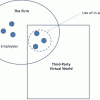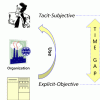Strategic advice to leverage new technologies
Technology is at the heart of nearly every enterprise, enabling new business models and strategies, and serving as the catalyst to industry convergence. Leveraging the right technology can improve business outcomes, providing intelligence and insights that help you make more informed and accurate decisions. From finding patterns in data through data science, to curating relevant insights with data analytics, to the predictive abilities and innumerable applications of AI, to solving challenging business problems with ML, NLP, and knowledge graphs, technology has brought decision-making to a more intelligent level. Keep pace with the technology trends, opportunities, applications, and real-world use cases that will move your organization closer to its transformation and business goals.
Recently Published
Doing Business in, with, and through Virtual Worlds: Part II
"Big Data" Issues Affecting Corporate BI and Data Warehousing
In February and March 2010, Cutter Consortium conducted a survey that asked 99 end-user organizations about their various data warehousing, BI, and other analytic efforts. One set of questions sought to determine data growth issues that organizations are facing with these efforts. Basically, my goal was to determine data growth trends and how they affect organizations.1
Master data management (MDM) is nothing new, but recent trends in the enterprise and industry seem to be breathing new life into it. All of the major platform/infrastructure vendors now have products in this space, including IBM, Microsoft, Oracle, and SAP, as well as many vendors focused specifically on MDM.
According to our latest research,1 overwhelmingly, the most troublesome "big data"-related challenges organization face with their data warehousing and BI efforts are (1) meeting complex query-processing requirements, and (2) transforming and loading data due to data volumes and windows of opportunity.
KM in Perspective: The Dynamic Knowledge Synchronization Model
KM in Perspective: The Dynamic Knowledge Synchronization Model
The accompanying Executive Report presents a vital aspect of knowledge management (KM) in organizations: bridging the gap between the tacit, subjective knowledge stored in people's heads and the explicit, objective knowledge stored within the organization's IT systems.
The Web as platform will enable firms to collaborate and manage relationships more effectively, deliver more value to new and existing markets, improve software development processes and products, and more fully integrate Web and mobile technologies.












